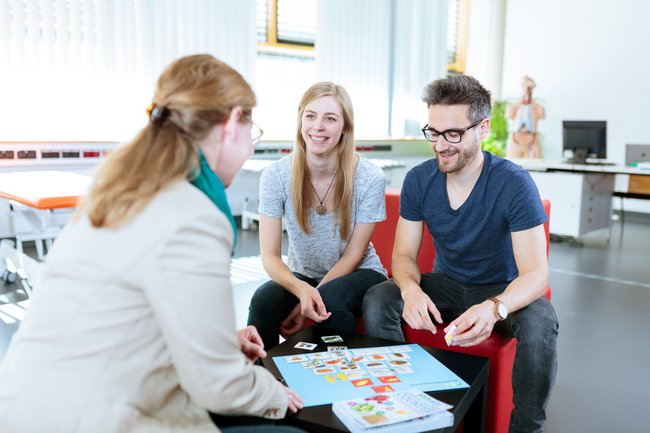Test Persons Wanted for Diabetes Study
Interdisciplinary Study Examines How Type 2 Diabetes Patients Support Each Other via Instant Messaging Service

The aim of the research project DiabPeerS under the leadership of the St. Pölten University of Applied Sciences in collaboration with the Österreichische Gesundheitskasse (the country’s biggest health insurance fund), the Karl Landsteiner University of Health Studies, and the University Hospital St. Pölten is to find out whether people suffering from type 2 diabetes benefit from online support and exchange with other affected persons using an instant messaging system.
The study is supposed help optimise the treatment of people with type 2 diabetes and alleviate the implications of the disease in future. The search for test persons has just begun.
Better Quality of Life through Self-Management
Approximately 800,000 people in Austria are suffering from type 2 diabetes, which is the most common variant of the disease. Left untreated, diabetes can lead to severe long-term complications such as cardiovascular and kidney diseases, lower quality of life, poorer physical health, and shorter life expectancy.
“The success of diabetes therapy is highly dependent on the affected persons themselves. Patients have to watch their lifestyle: for example, they need to observe an adequate diet and the right medication, measure their blood sugar and undergo medical examinations at regular intervals”, says Elisabeth Höld from the St. Pölten UAS’ Institute of Health Sciences who heads the study.
It is for this reason that diabetes self-management training to provide affected persons with knowledge and skills for dealing with their disease plays an important role in diabetes therapy. However, patients often find it hard to keep up the new habits in the long term in their everyday lives.
Mutual Support via Instant Messaging Service
Scientific studies have shown that the course of a diabetes disease can be positively influenced if affected persons have the opportunity to engage in exchange with other patients regarding their condition and the handling of disease-specific challenges. This method is referred to as “peer support” and is aimed at helping affected persons to improve their coordination and management of the wide spectrum of diabetes therapy elements. Initial studies have suggested that peer support of this kind actually has the power to improve not only the patients’ self-management abilities but also their adherence to blood sugar checking and their long-term health.
The objective of the DiabPeerS project is to facilitate this very exchanged of diabetes patients, so the project team are examining how this may be achieved using an instant messaging service on the mobile phone. The service used follows the same principles as WhatsApp, Telegram, Signal, and other such products. The study applies a software that guarantees the protection of the users’ personal data and privacy.
The study involves both newly diagnosed patients as well as experienced diabetics. The latter play a special role in this context: as moderators, they lead online groups and encourage discussions on type 2 diabetes by actively bringing up topics. In order to offer the best possible support for this group, appropriate training, accompanying material and advice from a dietitian are made available throughout the study.
Test Persons Wanted – Apply now!
More than 200 persons suffering from type 2 diabetes will be monitored over a period of 14 months for the study – one group with online peer support, the comparison group without.
In the first step, diabetes mellitus patients and participants of the disease management programme “Therapie Aktiv – Diabetes im Griff”, who fulfil the criteria for participation, will be contacted. “Therapie Aktiv” is a free programme offered by Österreichische Gesundheitskasse for type 2 diabetes patients, which relies on teamwork in treatment.
The project team is looking for two different groups of persons:
Group participants
These are persons wishing to exchange experiences with other type 2 diabetes patients. Their type 2 diabetes diagnosis should be no more than a year old and they should have a HbA1c of ≥ 6,5% (48 mmol / mol), be aged 40 or older and take oral antidiabetics.
Moderators
These people should like to take responsibility and moderate online groups. They are experienced in dealing with their disease and have known about their type 2 diabetes condition for at least three years. They are aged 60 or older, take oral antidiabetics and are enrolled in the free disease management programme “Therapie Aktiv – Diabetes im Griff”. A training of nine hours at the St. Pölten UAS prepares the future moderators for their role.
All participants should have a smartphone and be able to come either to the St. Pölten UAS or one of the university hospitals in Wiener Neustadt, Hollabrunn, or Mauer/Amstetten for the four scheduled measurements. The participants will receive an expense allowance of 50 EUR as well as their personal measurement results concerning body composition, abdominal girth, body weight and height, blood pressure, and selected blood parameters including a consultation thereof with a dietitian, and a small present from the Österreichische Gesundheitskasse.
In case of questions concerning the study, please contact the team by e-mail (diabpeers@fhstp.ac.at) or telephone (+43 2742 313228-572 or +43 676 847228-572).
The project “DiabPeerS – Improving Glycaemic Control in Patients with Type 2 Diabetes Mellitus through Peer Support Instant Messaging: A Randomised Controlled Trial” is financed by the Gesellschaft für Forschungsförderung Niederösterreich m.b.H and the provincial government of Lower Austria within the framework of the Life Science Call. The project is supported by the NÖ Landesgesundheitsagentur.
The Institute of Health Sciences and the Institute of Creative\Media/Technologies at the St. Pölten UAS supervise the project together with Österreichische Gesundheitskasse, the Division Psychological Methodology of the Department Psychology and Psychodynamics at the Karl Landsteiner University of Health Studies, and the clinical department of Internal Medicine 1 at the University Hospital St. Pölten.
